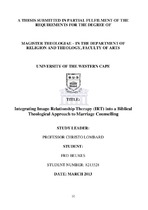Integrating imago relationship therapy (irt) into a biblical theological approach to marriage counselling
Abstract
As a minister who is deeply involved in Christian counselling I am constantly reminded just how many problems marriages are facing today. There is no question that the failure of this fundamental relationship has unquantifiable devastating results in the lives of couples, their children, and society as a whole. The more one works with people one realises that many couples in relationships are just hurting individuals in search of happiness and wholeness. Marriage provides the perfect relationship with elaborate promises and expectations of love and warmth, where all needs and dreams are to be met by the husband or wife. Sadly, however, as substantiated by divorce statistics, too many couples find this sacred space intended for love and fulfilment become the most vulnerable, unsafe space. As a minister searching for a systematic process to unravel this mystery of failed or failing marriages, I discovered a psycho-social model for therapy, called Imago Relationship Therapy (IRT), which not only produced excellent counselling results, but also seemed compatible with more theological approaches to couples therapy. IRT unravels for me the “why” and gives me a quantifiable aspect to
my work which helps me grasp conceptually that which I instinctively have discovered and known theologically. I have embarked on this research, firstly, to understand the problem and the extent thereof facing our society; secondly to identify the strengths and shortcomings in Pastoral Care theory and praxis (such
as the recurring problem of a realistic and workable Biblical counselling model for pastors), and thirdly to investigate the feasibility whether and how the Imago Relationship Theory could be integrated in Pastoral Care praxis. The intention was, and remains, that after I have done this research to make it available, in appropriate format, to help pastors in assisting couples to avoid pitfalls in their marriages. In turn, it is hoped that this new found perspective would also benefit the pastor and his wife, since many pastors find their marriages also under strain.
Every pastor who works with the lives of congregants understands the volatility of relationships. This understanding has been built over long periods of time with them and he has witnessed how their lives have morphed under pressure due to problems that at times have been overwhelming. Sadly some of the pain is self-inflicted or has been inflicted upon them. As one delves into this subject
matter one becomes aware of just how inadequately equipped some pastors really are and how important it is to equip them to effectively help others. I chose to examine Imago Relationship Therapy (IRT), knowing its efficacy, and wondered how this would fit into a Pneumatological counselling model. Various practical theologians (such as DJ Louw and JJ Rebel) have recently been discovering Pneumatology – the reflection on the work of the Holy Spirit, through whom the work of God the Father and God the Son is being applied and appropriated
in the person, in the congregation, and in the fullness of life in the world – as the framework for practical theology, especially Pastoral Care. I thus deliberately explored Pneumatology as such a theological Sitz im Leben for reflecting on IRT integrated into a Biblical model for counselling. I needed an affective therapeutic model which would could be integrated, and enhance the biblical framework in counselling. Furthermore this therapeutic mechanism needed to be subservient to attain the greatest goal of God and that is to serve and help transform humankind created in His Image. I conducted a systematic literature review of IRT and relevant theological insights from Pastoral Care theory. This investigation is to establish the viability of an integration of IRT into a Pneumatological Pastoral Care theory and praxis to be used as a Pastoral Tool for ministers dealing with the crisis of broken marriages. It was surprising to see how well IRT fits into the theological framework and can enhance an already effective psychological therapy process.

